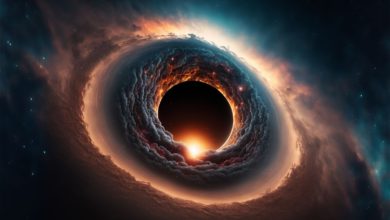
Today we all agree that our universe was created in a big bang. This is known as the big bang theory. Astronomers in the 20th century discovered that the universe continue to expand. Dark energy is the name given to the supernatural force that causes our universe’s expansion rate to accelerate over time instead of slowing down. That’s pretty much the opposite of what you’d expect from a universe that started with a big bang. Scientists thought that the expansion of the universe would go on forever, or that eventually – if the universe had enough mass and the resulting self-gravity – there might be a great contraction. In early 21st century cosmology, the idea evolved further. The universe seems to be expanding faster today than it did billions of years ago. What could cause the rate of expansion to increase? Astronomers now sometimes talk about a mystical repulsive force as a way to understand it.
Until the late 1990s, most cosmologists believed that the universe did not have enough mass to cause a major contraction. In particular, data from the 2dF Galaxy Redshift Survey and the Sloan Digital Sky Survey suggest that even though the universe is pulled back by its own mass and gravity, it confirms that the universe is expanding forever, albeit always at a slower rate.
In 1998, a survey of Type 1A supernovae gave the first indication of something revolutionary to be discovered. These massive bursts of dying giant stars are extremely useful to astronomers because they always give out the same amount of light, which could be used as a standard for calculations of distances in the universe. This can be explained with a very simple example, by considering that the fireflies flying at night all shine with the same brightness and by measuring how bright they are from where you are, you can calculate their distance.
The survey was conducted by an international team of astronomers, including Americans Adam Riess and Saul Perlmutter and Australia’s Brian Schmidt, using eight telescopes around the world and the aim of their research has been to use the distance of Type 1A supernovae to calculate the expansion rate of the universe, known as the Hubble constant. (which, of course, is technically not a constant, as the universe’s expansion rate varies with time).
The results of the survey were surprising. Distant supernovae that exploded when the universe was only 2/3 of its current age were far farther away than where they should have been. The implication was that the universe was expanding much faster than it should have been if current ideas were correct.
When these results were revealed, there was much skepticism in the astronomical community, and the observations were quickly investigated by other groups and through alternative methods. It revealed at the turn of the millennium that the expansion of the universe was not slowing down as previously believed. Otherwise, the expansion of the universe is actually happening at a faster rate.
Even more surprisingly, until seven or eight billion years after the Big Bang, as one would expect, the rate of cosmic expansion was slowing down, but then, for completely unknown reasons, a mysterious “antigravity” force overcame gravity which put the brakes on expansion and under its dominance, cosmic expansion stops decelerating and accelerates.
Can you imagine how shocked astronomers and cosmologists would have been by this discovery?
Scientists named the force responsible for this acceleration as dark energy. Here dark means unknown rather than literally dark as in dark matter. (Dark energy and dark matter are completely unrelated phenomena)
To add to the mystery, the properties of this strange dark energy were also found to match Einstein’s Universal Constant. In some cases, this was called the fudge factor, and Einstein later called it the biggest professional mistake of his life.
Dark energy is one of the great unsolved mysteries of cosmology. It is now thought that 68% of everything in the universe is this dark energy, 5% of all the matter we can actually see, and it is thought that the rest consists of dark matter which is another cosmic mystery.

Dark energy acts like Einstein’s anti-gravity force, but its nature and origin are still uncertain. One of the biggest mysteries is why Dark energy started to dominate the expansion rate of the universe at a certain time billions of years after the Big Bang. If it exists now, why hasn’t it been there all along? It is an unsolved problem.
Cosmologists still have no idea whether dark energy is accelerating the universe’s expansion forever. Thus, in the future, this acceleration is believed to literally ‘rip’ all the material in the universe, overtaking the force currently holding the universe together, and it is a nightmare bringing out the meaning ‘big-rip’ (opposite of big-bang)!

There are several current and future space missions and ground-based surveys investigating the nature of dark energy, including NASA’s orbiting Wide-Field Infrared Survey Telescope (WFIRST) and the International Dark Energy Survey in Chile.
It is hoped that soon we will have a greater understanding of this mysterious force that has such an influence on the future of the universe. But to get that understanding, we need to get a more complete understanding of the history of the universe. However, exploring 13.7 billion years of archeology is an extremely difficult and time-consuming process, and since many of the ancient layers of that history have disappeared or are unclear, we cannot expect a sudden revelation about it in recent times.
References:
1.https://earthsky.org/space/definition-what-is-dark-energy/
2.https://www.quora.com/How-did-Einstein-prove-Newton-wrong
3.https://home.web.cern.ch/science/physics/dark-matter
4.https://www.livescience.com/cosmological-constant.html



